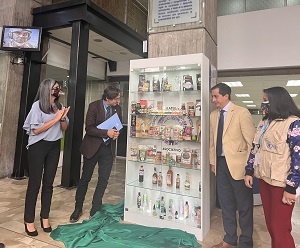JP GTA promotes voices of rural women leaders in Ecuador
11 April 2022

Marking International Women's Day 2022, the EU-RBA Joint Programme on Gender Transformative Approaches for Food Security and Nutrition (JP GTA) and the Ministry of Agriculture and Livestock of Ecuador highlighted their collaboration through the launch of the ‘Mesa Mujer Rural’, or Rural Women’s Roundtable, a national initiative aimed at promoting the voices of rural women leaders. The launch took place within the framework of the Rural Women and Family Farming Event held in Quito on 9 March 2022.
The JP GTA is implemented by the three United Nations Rome-based Agencies – FAO, IFAD and WFP – in collaboration with and through financial support from the European Union (EU). Ecuador is one of the JP GTA’s two pilot countries for implementation of country-level activities, together with Malawi.
As its main objective, the Joint Programme seeks to address the root causes of gender inequalities and promote food security, improved nutrition and sustainable agriculture with a view to contributing to the achievement of Sustainable Development Goal (SDG) 2. It is working to support the Rome-based Agencies, the EU and their partners to embed gender transformative approaches in their policy dialogues, programmes, working modalities and institutional culture.
In line with the objectives of the National Agricultural Strategy for Rural Women (ENAMR), the collaboration between the Joint Programme and the Ministry of Agriculture and Livestock promotes women's participation, through civil society initiatives, in the national policies the Ecuadorian government is seeking to implement, with the Rural Women’s Roundtable as a space for analysis and discussion.
The Rural Women’s Roundtable constitutes a mechanism to convene the voices of rural women leaders in initiatives for citizen participation regarding improvements in the country’s agricultural sector. In addition, it encourages the professional growth of Ecuadorian women who are involved in agricultural activities, such as harvesting, fishing, artisanship or other activities. It does so through local capacity building initiatives that can positively impact their productive interests and rights as well as their access to financial resources and education.
As part of this capacity building process, the event featured the graduation ceremony of several rural women leaders who participated in an advanced virtual course on “rural family farming, technical assistance and rural women with a gender and rights approach”. The training was first implemented with the technical assistance of some of the Joint Programme’s implementing agencies who also supported the development of the ENAMR, and will be continued within the framework of the JP GTA.

During the event, the Joint Programme also unveiled a glass showcase it donated to the Ministry of Agriculture and Livestock. The glass showcase will exhibit women's products with the ‘Rural Family Farming’ seal, thereby giving the women's work more visibility and greater marketing scope.
Delivering remarks from Rome, Hajnalka Petrics, Global Coordinator of the JP GTA, mentioned the methodologies of FAO, IFAD and WFP, in collaboration with and through financial support from the EU, which are being applied in the provinces of Manabí and Imbabura within the framework of the Joint Programme and in coordination with the ENAMR. A key objective is to identify discriminatory social norms in order to highlight and change recurring behaviours that prevent overcoming gender barriers not only in households and rural communities but also in the organizational culture and policies of the institutions involved in the process of implementing JP GTA activities.
Representatives of the UN Rome-based Agencies – Agustín Zimmermann (FAO), Anni Mandelin (IFAD) and Cristina Vera (on behalf of WFP Representative Matteo Perrone) – spoke about their approaches to training, empowerment and gender mainstreaming in Ecuador. Using gender transformative strategies and tools, they seek to give visibility to the work of rural women, thereby strengthening their productive capacities, access to services, access to credit and financing, and access to markets and decision-making. They also emphasized their commitment and support to the national and local governments in achieving gender equality for a sustainable and equitable future for women, their households and communities.
Finally, Deputy Minister of Rural Development Luis Muñoz inaugurated the glass showcase in the building of the Ministry of Agriculture and Livestock and invited participants to tour the Feria de Sabores y Saberes (‘Fair of Flavors and Knowledge’) which took place in parallel to the Rural Women's Roundtable launch event – two activities aimed at narrowing existing gaps and ensuring better living conditions for rural women. The Deputy Minister called on all women participants to never stop dreaming, stressing that education and capacity building are essential for their development.
Images: © FAO Ecuador
More:
- FAO en Ecuador: https://www.fao.org/ecuador/noticias/detail-events/ar/c/1480496/
- Flickr album - 'Mesa Mujer Rural y Feria de Sabores y Saberes': https://www.flickr.com/photos/representacionfaoecuador/albums/72177720297346840
- Flickr album - 'JP GTA in Ecuador': https://www.flickr.com/photos/representacionfaoecuador/albums/72157720197776344
About the JP GTA:
- Website: https://www.fao.org/joint-programme-gender-transformative-approaches/
- Flyer (English): https://www.fao.org/publications/card/en/c/CB7065EN
- Flyer (Spanish): https://www.fao.org/publications/card/es/c/CB7065ES
Contacts:
- Hajnalka Petrics, Global Coordinator of the JP GTA: [email protected]
- Geovanny Francisco Enríquez, National Coordinator of the JP GTA in Ecuador: [email protected]
- JP GTA: [email protected]




